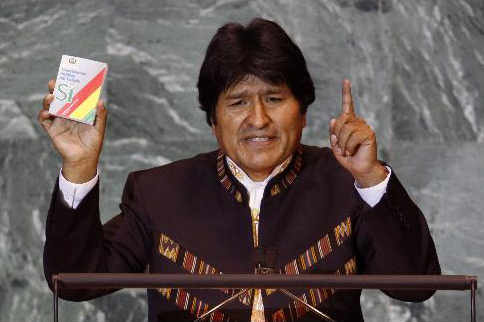
(above) Evo Morales, Bolivia's president, holds a copy of his proposed new constitution for the
country as he speaks at the 63rd annual United Nations General Assembly in New York,
on Tuesday, Sept. 23, 2008. (Photographer: Andrew Harrer/Bloomberg News)
Bolivia Seeks Iran Investment as U.S. Ties Unravel (Update1)
September 24, 2008 - Bloomberg
By Matthew Walter and Jose Enrique Arrioja
Sept. 24 (Bloomberg) -- Bolivian President Evo Morales said he's seeking investment from Iran, Russia and Venezuela to boost natural gas output amid worsening relations with the U.S.
Bolivia, with the second-biggest gas reserves in South America, is in talks with Iran and Venezuela to build a $10 billion petrochemicals complex, and has signed a framework agreement for investment by Russia's OAO Gazprom, Morales said in an interview today in New York.
Morales, 48, at odds with the U.S. over drug policy and his alliance with Venezuelan President Hugo Chavez, said he expects the U.S. to eliminate his country's preferences on $648 million of trade. Morales is also seeking to replace investment from Brazil's state-controlled oil company, which has cut off new capital in response to Morales's demands for revised contracts and nationalizations.
"We're betting on a huge petrochemicals investment, that will of course be integrated, including exploration and production," Morales said during the interview at the Bolivian mission to the United Nations. U.S. "preferential trade status isn't a gift. Just because we aren't pro-Yankee, they scrutinize us. They can go right ahead, we are prepared."
Threats
The president, a self-proclaimed foe of capitalism, today repeated threats that he'll revoke gas concessions of companies that fail to invest in new capacity. In May, Bolivia spent $43.1 million to take over four energy companies, and last year took control of Petroleo Brasileiro SA's refineries. The plants process liquids associated with natural gas and supplied all of Bolivia's gasoline and most of its other vehicle fuels. Petrobras natural gas fields continue to supply gas to Brazil.
"If the concessionaries don't want to invest, we'll take back those concessions and invest with Venezuela and Iran," said Morales, who wore a black suit with a collarless jacket embroidered in an indigenous Bolivian style. The country has "mega-projects" that await funding and need to get done, he said.
Morales said representatives from Iran will be conducting "technical studies" to determine how to move ahead with the petrochemicals project.
Falling Investment
Investment in the oil and gas industry in Bolivia fell to $149 million last year during a period of record energy prices from a peak of $580.8 million in 1999.
Prospects for attracting private capital have dimmed further with a mounting political conflict that turned violent over the past two weeks.
At least 18 people died in clashes between opposition and pro-government groups, and natural gas supply to Brazil, Bolivia's top customer, has been disrupted by sporadic pipeline attacks in opposition-led provinces demanding increased autonomy. Morales, meanwhile, is pushing ahead with a referendum on a new constitution to bolster the central government's power and reduce tax revenue for the provinces.
"Private investment has really not been coming in," said Susan Purcell, director of the Center for Hemispheric Policy at the University of Miami. "That doesn't mean that the Chinese or the Venezuelans -- basically the countries they would be using -- couldn't bring in government investments."
Civil War
The president said he doesn't think the country is headed toward a civil war, and said he won't agree to any changes demanded by the opposition for the new constitution.
Morales said a meeting of the Union of South American Nations today at the UN to discuss the Bolivian conflict shows the region can resolve its problems without U.S. intervention.
Morales expelled U.S. Ambassador Philip Goldberg earlier this month, accusing him of holding private meetings with opposition leaders who are supporting the opposition's autonomy drive. Goldberg said it's normal for an envoy to meet with all political parties in any country. The U.S. State Department said it would offer its citizens in Bolivia flights out of the country.
"This has been an attempted coup d'etat," Morales said today.
Bolivia's widening rift with the U.S. reinforces its commitment to the socialist, anti-U.S. alliance led by Chavez as he taps his country's oil windfall to provide international aid. Petroleos de Venezuela SA, the state oil company, will begin exploring for oil and gas in two areas of Bolivia next month, Morales said today.
"The space between Morales and Chavez becomes a lot narrower if the U.S. follows policies that essentially punish the Bolivian government," said Michael Shifter, vice president of the Inter-American Dialogue, a policy research group in Washington. "What this does is I think undercut those in the U.S. government who have been promoting greater engagement with the Morales government. It strengthens the hard liners."
To contact the reporter on this story: Matthew Walter in New York at mwalter4@bloomberg.net; Jose Enrique Arrioja in New York at +1- jarrioja@bloomberg.net